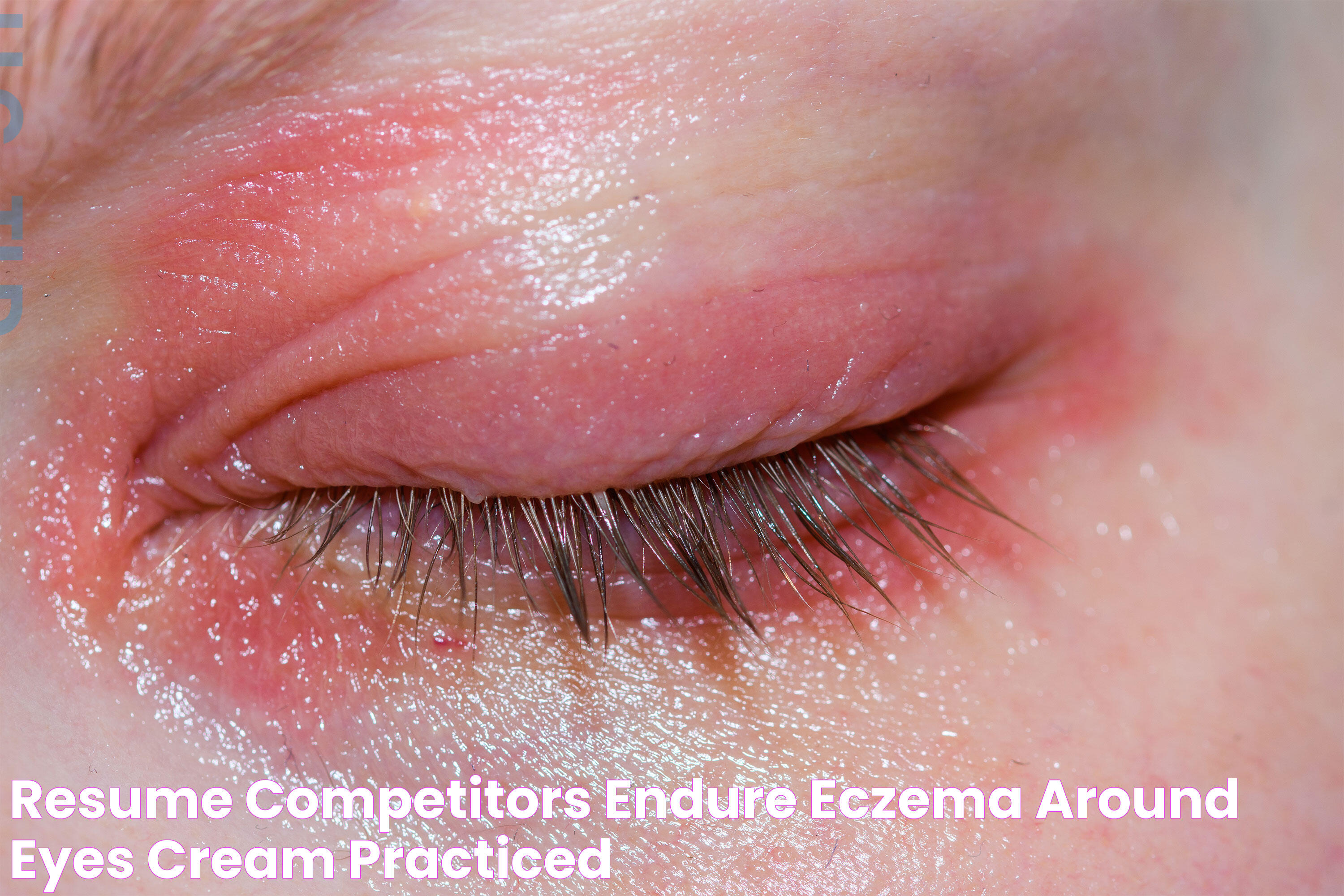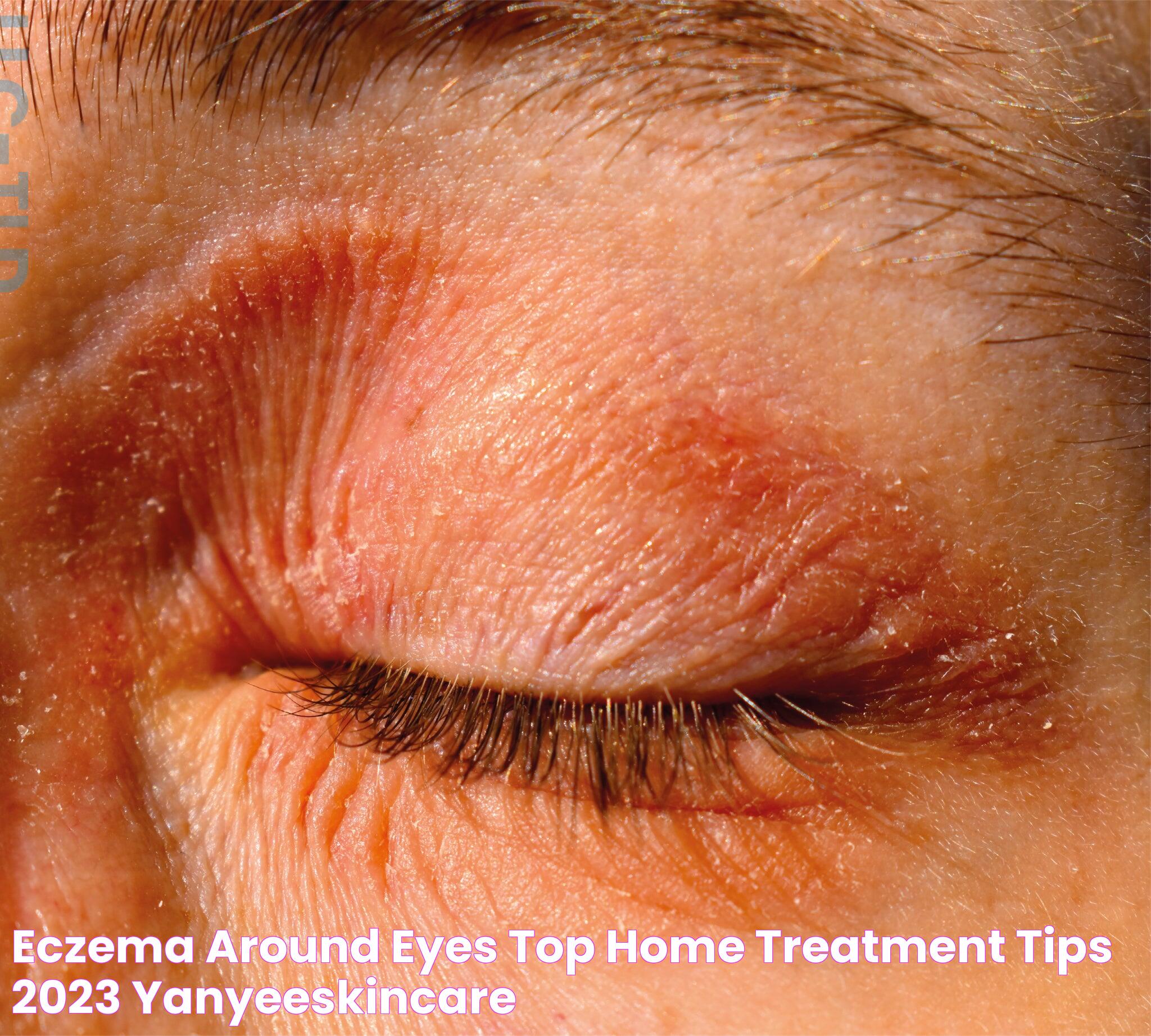Eczema around eyes is a common condition that affects many individuals, causing discomfort and distress due to its visibility and sensitivity. The skin surrounding the eyes is delicate, making it prone to irritation and inflammation. This article explores effective remedies and insights for managing eczema around eyes, aiming to provide relief and improve quality of life for those affected.
Eczema around eyes can manifest as redness, itching, and swelling, often leading to self-consciousness and frustration for sufferers. Understanding the causes and triggers is essential for effective management. By identifying these factors and implementing appropriate treatments, individuals can minimize symptoms and prevent flare-ups.
With a focus on practical solutions and expert advice, this comprehensive guide offers valuable information on eczema around eyes, including potential causes, treatment options, and preventive measures. Whether you're experiencing eczema for the first time or seeking ways to manage chronic symptoms, this article aims to equip you with the knowledge and tools needed to tackle this condition confidently.
Read also:In Vitro A Closer Look At Its Impact And Applications
Table of Contents
- What is Eczema Around Eyes?
- Causes of Eczema Around Eyes
- Symptoms and Diagnosis
- Treatment Options for Eczema Around Eyes
- Home Remedies That Work
- Diet and Lifestyle Changes
- How to Prevent Eczema Around Eyes?
- When to See a Doctor?
- Eczema Around Eyes in Children
- Psychological Impact of Eczema
- Eczema Around Eyes vs. Other Conditions
- Latest Research and Developments
- Common Myths About Eczema
- FAQs
- Conclusion
What is Eczema Around Eyes?
Eczema, scientifically known as atopic dermatitis, is a chronic inflammatory skin condition characterized by itchy, red, and swollen patches. Eczema around eyes specifically refers to this condition occurring in the periorbital area, which includes the eyelids and the skin surrounding the eyes.
This form of eczema can be particularly distressing due to the sensitive nature of the skin in this area. The condition can cause significant discomfort and may affect an individual's self-esteem due to its visible nature. Understanding eczema around eyes involves recognizing the signs and symptoms, as well as being aware of the potential triggers that may lead to flare-ups.
Causes of Eczema Around Eyes
The exact cause of eczema around eyes is not fully understood, but it is believed to result from a combination of genetic and environmental factors. Some common causes and triggers include:
- Genetic predisposition: Individuals with a family history of eczema, asthma, or hay fever are more likely to develop eczema around eyes.
- Allergens: Exposure to allergens such as pollen, dust mites, pet dander, or certain foods can trigger eczema flare-ups.
- Environmental factors: Factors such as extreme temperatures, humidity changes, and pollution can exacerbate symptoms.
- Skin irritants: Harsh skincare products, soaps, and cosmetics can irritate the skin around the eyes, leading to eczema.
Symptoms and Diagnosis
Eczema around eyes presents with several distinct symptoms, including:
- Redness and swelling around the eyes
- Intense itching or burning sensation
- Dry, scaly, or flaky skin
- Crusting or oozing in severe cases
Diagnosing eczema around eyes typically involves a physical examination by a dermatologist or healthcare provider. They may inquire about medical history, family history of eczema, and any potential triggers. In some cases, patch testing or skin biopsy may be conducted to rule out other skin conditions.
Treatment Options for Eczema Around Eyes
Treating eczema around eyes focuses on reducing inflammation, alleviating itching, and preventing future flare-ups. Treatment options may include:
Read also:Effective Migraine Relief Where Do They Inject Botox For Migraines
- Topical corticosteroids: These are anti-inflammatory medications applied directly to the affected area to reduce swelling and itching.
- Calcineurin inhibitors: These topical medications help modulate the immune response and are used as an alternative to steroids.
- Moisturizers: Regular application of gentle, fragrance-free moisturizers helps maintain skin hydration and prevent dryness.
- Antihistamines: Oral antihistamines may be prescribed to alleviate severe itching and improve sleep.
Home Remedies That Work
Several home remedies may provide relief for eczema around eyes and complement medical treatments:
- Cold compresses: Applying a cold, damp cloth to the affected area can soothe inflammation and reduce itching.
- Oatmeal baths: Colloidal oatmeal added to a bath can calm irritated skin and provide relief.
- Coconut oil: This natural moisturizer can help reduce dryness and improve skin barrier function.
- Aloe vera gel: Known for its soothing properties, aloe vera can be applied to the skin to alleviate irritation.
Diet and Lifestyle Changes
Adopting certain dietary and lifestyle changes can play a crucial role in managing eczema around eyes:
- Identify and avoid triggers: Keeping a diary of foods and environmental triggers can help identify patterns and prevent flare-ups.
- Maintain a balanced diet: Consuming a diet rich in fruits, vegetables, and omega-3 fatty acids can support skin health.
- Practice stress management: Stress can exacerbate eczema symptoms, so incorporating relaxation techniques like yoga and meditation can be beneficial.
How to Prevent Eczema Around Eyes?
Preventing eczema around eyes involves minimizing exposure to known triggers and maintaining a consistent skincare routine:
- Use hypoallergenic products: Choose skincare and cosmetic products labeled as hypoallergenic and free from fragrances and dyes.
- Moisturize regularly: Keeping the skin around the eyes well-moisturized helps maintain the skin barrier and prevent dryness.
- Protect from environmental factors: Wear sunglasses and hats to shield the eyes from harsh weather conditions.
When to See a Doctor?
While mild cases of eczema around eyes can often be managed at home, it's important to seek medical attention if:
- Symptoms persist or worsen despite treatment
- There are signs of infection, such as increased redness, warmth, or pus
- The condition significantly impacts daily life or mental well-being
A healthcare provider can offer a tailored treatment plan and rule out other potential causes of symptoms.
Eczema Around Eyes in Children
Children are particularly susceptible to eczema around eyes, and managing it requires special considerations:
- Consult a pediatric dermatologist: A specialist can provide guidance on appropriate treatments for children.
- Gentle skincare: Use mild, fragrance-free products designed for sensitive skin to avoid irritation.
- Address scratching behavior: Educate children about the importance of avoiding scratching to prevent skin damage.
Psychological Impact of Eczema
Eczema around eyes can have a significant psychological impact, affecting self-esteem and emotional well-being. Individuals may experience:
- Social anxiety or embarrassment due to visible symptoms
- Depression or low self-confidence
- Sleep disturbances due to itching
Support from mental health professionals, support groups, and open communication with loved ones can provide emotional relief and coping strategies.
Eczema Around Eyes vs. Other Conditions
Distinguishing eczema around eyes from other skin conditions is essential for accurate diagnosis and treatment. Conditions to consider include:
- Psoriasis: Unlike eczema, psoriasis often presents with thicker, silvery scales.
- Contact dermatitis: This condition results from direct contact with an irritant or allergen.
- Blepharitis: Inflammation of the eyelids caused by bacterial infection or skin conditions like rosacea.
Latest Research and Developments
Ongoing research into eczema around eyes is focusing on better understanding the condition and developing new treatments. Recent developments include:
- Advancements in biologic treatments targeting specific immune pathways
- Exploration of the role of the skin microbiome in eczema
- Studies on the impact of diet and probiotics on eczema symptoms
Staying informed about the latest research can help individuals make informed decisions about their treatment options.
Common Myths About Eczema
Several myths and misconceptions surround eczema around eyes, including:
- Eczema is contagious: Eczema is not contagious and cannot be spread through contact.
- Only children get eczema: While common in children, eczema can affect individuals of all ages.
- Topical steroids are harmful: When used as directed by a healthcare provider, topical steroids are safe and effective.
FAQs
Q: Can eczema around eyes cause vision problems?
A: Eczema itself does not directly affect vision, but severe inflammation and swelling can temporarily impact the ability to open the eyes fully.
Q: Are there any foods that can trigger eczema around eyes?
A: Common dietary triggers include dairy, eggs, soy, and nuts, but triggers can vary from person to person. Identifying and avoiding these foods may help manage symptoms.
Q: Is eczema around eyes more common in certain seasons?
A: Eczema can be exacerbated by seasonal changes, particularly in winter when the air is dry and cold.
Q: Can makeup worsen eczema around eyes?
A: Yes, certain cosmetics, especially those with fragrances and harsh chemicals, can irritate the skin and worsen eczema symptoms.
Q: Is eczema around eyes hereditary?
A: A family history of eczema, asthma, or allergies can increase the likelihood of developing eczema around eyes.
Q: Can stress trigger eczema flare-ups?
A: Yes, stress is a known trigger for eczema flare-ups, making stress management an important aspect of treatment.
Conclusion
Eczema around eyes is a challenging condition that requires a multifaceted approach for effective management. Understanding the causes, symptoms, and treatment options empowers individuals to take control of their condition and reduce its impact on daily life.
By adopting a proactive skincare routine, identifying and avoiding triggers, and seeking medical guidance when necessary, individuals can alleviate symptoms and improve their quality of life. With ongoing research and advancements in treatment, the future holds promise for even more effective solutions for eczema around eyes.
For more information and support, consider visiting reputable resources such as the National Eczema Association (nationaleczema.org).

